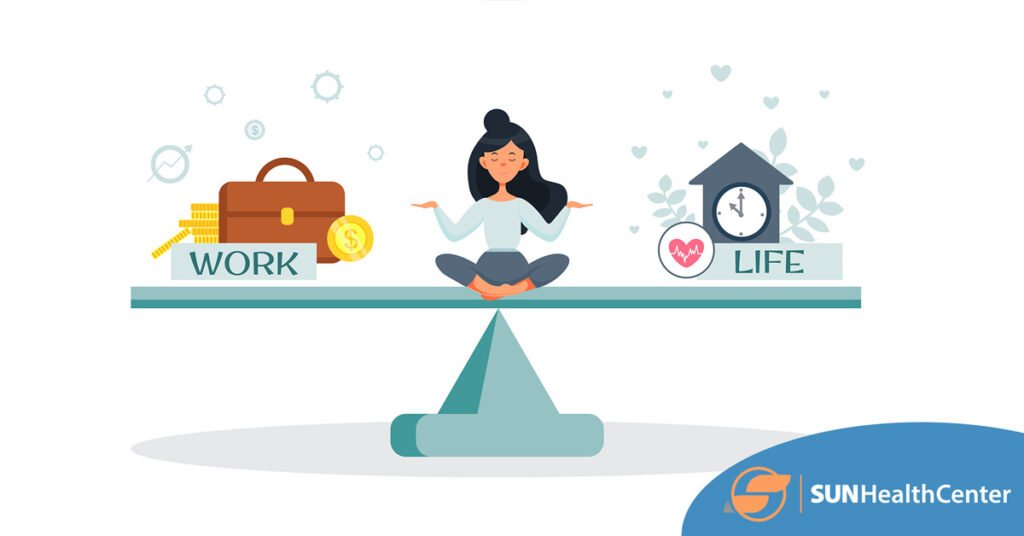
Work can often take precedence over other aspects of your life, even if you don’t mean it to. While building a successful career can be fulfilling, it can also be stressful. Long-term stress can affect your mental health, resulting in feelings of anxiety and depression that can worsen over time if they aren’t addressed. However, achieving work-life balance can help.
Work-life balance refers to time spent at your job or performing day-to-day responsibilities compared to time spent relaxing, engaging in hobbies or enjoying time with friends and family. If you’re struggling to achieve a healthy balance, explore why it’s important and what strategies for a balanced life best match your needs.
Why Is Work-Life Balance Important?
When work and other responsibilities dominate your life, it can be challenging to find substantial fulfillment. Even companies are aware of this. Job listings are increasingly advertising “flexible schedule” or “great work-life balance” to attract candidates.
Spending all your time working makes it nearly impossible to relax or participate in activities that bring you joy and relieve stress. When you have no outlet to alleviate stress, it can accumulate over time, resulting in poor mental health or physical health complications, including cardiovascular disease.
According to research by The American Institute of Stress, 62% of North American employees experience high levels of workplace stress and fatigue. Without a good work-life balance, this stress can lead to burnout and decreased productivity, making it difficult to focus on any aspect of your life.
Expert Advice on Work-Life Harmony to Reduce Stress
Work-life balance is crucial for your mental health, but it can be hard to achieve, especially if you’re a parent with small children or a young professional trying to appeal to future prospects. It may feel impossible to squeeze in even a small break. You may need to make some difficult decisions, but improving your work-life balance and reducing stress can be more rewarding and beneficial long-term. Here are a few tips on achieving this.
Ask for Help
Asking for help may feel weak, but everyone gets overwhelmed by responsibilities at times. If you feel like you’re juggling too much, talk to your supervisor about restructuring your schedule or delegating tasks to other employees. And if they respond negatively, it may be time to consider whether the job is worth sacrificing your health and well-being.
Limit Nonessential Tasks
Track how much time you spend on daily tasks throughout the workday. If nonessential tasks, such as checking email or browsing the internet, are consuming significant portions of time, consider reassessing your daily schedule. Prioritize essential activities and limit time spent on less productive tasks to avoid working long hours.
Take Breaks When Possible
Pushing through work without any breaks can affect your overall performance and increase the risk of stress, burnout or fatigue. Stepping away from work, even for a few minutes, can help you recharge, feel more productive and boost your mood. Try taking breaks throughout the workday to go for a walk, have a snack or browse social media.
Don’t Be Afraid to Unplug
If technology, especially your smartphone, is used for your job, escaping work can be hard. Technology enables instant communication, which can make everything feel more rushed and stressful. Consider leaving your phone, laptop or tablet in a separate room to spend uninterrupted time reading, watching TV or being outside.
Practical Strategies for Balancing Career and Personal Life
Remember, there’s no perfect or ideal method for achieving work-life balance. Focusing too much on developing a perfect schedule may cause more stress, and that’s the last thing you want. It’s important to create a schedule that maximizes your ability to complete daily responsibilities and carve out personal time. Here are strategies for balancing your career and personal life:
- Set boundaries. Establish a consistent schedule with clear working hours, and block off personal time. When you create boundaries, your employer will know when it’s acceptable to contact you and when you’re off the clock.
- Make time for friends and family. Spending time with loved ones can boost your mood, but it can be hard to find times when everyone’s schedules align. Consider adding family time, date nights and friend meetups to your calendar to help prioritize them as you do with work.
- Prioritize self-care. Don’t forget to schedule quality alone time as well. Whether it’s for an hour per day or one evening per week, it’s important to engage in soothing self-care activities to rest and recharge.
- Don’t overbook your schedule. Refrain from committing to too many things before you know how much you can handle. If you schedule activities every night, they may start to feel like chores and lose appeal. Start with a few activities per week and make adjustments as needed.
Creating Sustainable Habits for a Well-Balanced Life
When striving for work-life balance, your health and well-being should always come first. You may feel pressured to take on extra work tasks or spend every free moment with loved ones, but this isn’t sustainable. Don’t be afraid to say no if your schedule is too busy or you need time to focus on yourself.
If stress from balancing your work and personal life starts to feel unbearable, consider reaching out for support. Confide in trusted loved ones about how you’re feeling. They may be experiencing similar situations and have advice to share. You can also incorporate activities such as exercise or yoga into your daily routine to alleviate stress or mental health concerns, including anxiety or depression.
However, experiencing chronic stress or long-term mental health symptoms may signify a larger problem. Professional help, including therapy or counseling, may be needed to uncover underlying issues impacting your ability to find peace and balance.
